Russian History
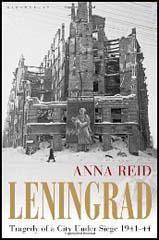
Title: Leningrad
Author: Anna Reid
Editor:
Publisher: Bloomsbury
Price: £11.95
Bookshop: Amazon
Spartacus Website: Operation Barbarossa
Category:
On 8 September 1941, eleven short weeks after Hitler launched Operation Barbarossa, his brutal surprise attack on the Soviet Union, Leningrad was surrounded. The siege would not be lifted for two and a half years and during the 872 days of blockade and bombardment as many as two million Soviet lives would be lost. Had the city fallen, the history of the Second World War - and of the twentieth century - would have been very different. Leningrad is a gripping narrative history interwoven with personal stories - immediate accounts of daily siege life drawn from diarists and memoirists on both sides. These twentieth-century European civilians living through unbearable hardship reveal the terrible details of life in the blockaded city: the all-consuming and daily search for food; crawling up ice-rounded steps on hands and knees, hauling a bucket of water; a woman who has just buried her father noticing how the cemetery guards have used a frozen corpse with outstretched arm and cigarette between its teeth as a signpost to a mass grave; another using a dried pea to make a rattle for her evacuated grandson's first birthday, and putting it away in a drawer when she hears, six months later, that he has died of meningitis. In Leningrad, Anna Reid answers many of the previously unanswered questions about the siege. How good a job did Leningrad's leadership do - would many lives have been saved if it had been better organised? How much was Stalin's and Moscow's wariness of western-leaning Leningrad (formerly the Tsars' capital, St Petersburg) a contributing factor? How close did Leningrad come to falling into German hands? And, above all, how did those who lived through it survive?
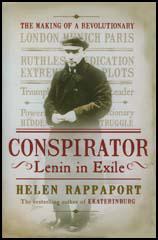
Title: Conspirator: Lenin in Exile
Author: Helen Rappaport
Editor:
Publisher: Hutchinson
Price: £20.00
Bookshop: Amazon
Spartacus Website: Lenin
Category:
Conspirator is the compelling story of Lenin in exile. It tells how, for seventeen years, he lived a hand-to-mouth existence outside Russia, working towards the upheaval that in 1917 transformed the political landscape of Europe: the Russian Revolution. Constantly watched by the secret police, the arch conspirator and his cohorts were dependent on the protection of a shadowy network of like-minded friends and supporters. Obsessive, penniless and driven, they took huge risks to publish and smuggle back into Russia the samizdat literature that spread their message. Lenin was always on the move, between the great cities of Europe - Paris, London, Geneva, Brussels and Munich - and the rural backwaters of Finland and Poland. He led an uncertain life, often under assumed names, fleeing lodgings at a monent's notice and frequently short of food. Helen Rappaport's lively account describes Lenin’s triumphs and the conflicts, personal and political, with those who shared his exile. She builds up a vivid picture of Russian émigré life and of how Lenin and the Bolsheviks worked to achieve his vision of a Soviet social democracy. She also explores the toll that their extraordinary existence took not just on Lenin but on the loyal group that surrounded him, and particularly on the women in his life: his long-suffering wife, Nadezhda Krupskaya, his mother-in-law, and his mistress, Inessa Armand, as well as his mother and sisters back home.
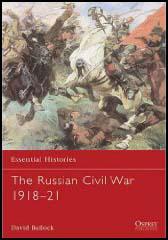
Title: The Russian Civil War 1918-22
Author: David Bullock
Editor:
Publisher: Osprey
Price: £55.00
Bookshop: Amazon
Spartacus Website: Russian Civil War
Category:
The Russian Civil War is the most important civil war of the 20th century, changing the lives of over half a billion people and dramatically shaping the geography of Europe, the Far East and Asia. Over a four-year period 20 countries battled in a crucible that would give birth to Communist revolutions worldwide and the Cold War. David Bullock offers a fresh perspective on this conflict, examining the forces involved, as well as the fascinating intervention by Allied forces. At the dawn of modern war, as cavalry duelled with tanks, aircraft, and armoured trains along shifting fronts, this title tells a military story enacted against a backdrop of political and social revolution and within the context of immense human loss. The reader cannot fail to be moved by the rare photographs and illustrations that make this history come alive.
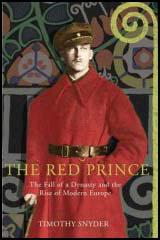
Title: The Red Prince
Author: Timothy Snyder
Editor:
Publisher: Bodley Head
Price: £20.00
Bookshop: Amazon
Spartacus Website: Spies and Spymasters
Category:
The first ever biography of the extraordinarily colourful Archduke Wilhelm von Habsburg (1895-1947). Tattooed, bisexual, crossdressing, multilingual, he was a major - & symbolic - figure in 20th-century European culture & politics. Born into one of the great European dynasties with every expectation of a glittering future, instead he became a playboy in Paris during the 1930s and died – a spy for Britain - under interrogation in a Soviet prison. The arc of Wilhelm’s life therefore describes the dying fall of the ancien régime – the Europe of his birth bears very little resemblance to that of his death.
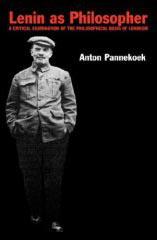
Title: Lenin as Philosopher
Author: Anton Pannekoek
Editor:
Publisher: Merlin Press
Price: £10.95
Bookshop: Amazon
Spartacus Website: Lenin
Category:
In the aftermath of the Russian Revolution, Anton Pannekoek investigated the impact of Lenin's ideas and of his philosophical work Materialism and Empirio-criticism, which had appeared in Russian in 1908. In the book Pannekoek argues that the economic system created after the revolution was state capitalism and that a new class of officials was in charge. "Lenin as Philosopher: A Critical Examination of the Philosophical Basis of Lenin" was first published in 1938.
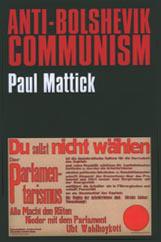
Title: Anti-Bolshevik Communism
Author: Paul Mattick
Editor:
Publisher: Merlin Press
Price: £14.95
Bookshop: Amazon
Spartacus Website: Russian Civil War
Category:
Communism aims at putting working people in charge of their lives. A multiplicity of Councils, rather than a big state bureaucracy is needed to empower working people and to focus control over society. Mattick develops a theory of a council communism through his survey of the history of the left in Germany and Russia. He challenges Bolshevik politics: especially their perspectives on questions of Party and Class, and the role of Trade Unions. Mattick argues that the revolutions which succeeded, first of all, in Russia and China, were not proletarian revolutions in the Marxist sense, leading to the association of free and equal producers, but state-capitalist revolutions, which were objectively unable to issue into socialism. Marxism served here as a mere ideology to justify the rise of modified capitalist systems, which were no longer determined by market competition but controlled by way of the authoritarian state. Based on the peasantry, but designed with accelerated industrialisation to create an industrial proletariat, they were ready to abolish the traditional bourgeoisie but not capital as a social relationship. This type of capitalism had not been foreseen by Marx and the early Marxists, even though they advocated the capture of state-power to overthrow the bourgeoisie but only in order to abolish the state itself.
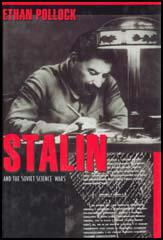
Title: Stalin and the Soviet Science Wars
Author: Ethan Pollock
Editor:
Publisher: Princeton University Press
Price: £19.95
Bookshop: Amazon
Spartacus Website: Joseph Stalin
Category:
Between 1945 and 1953, while the Soviet Union confronted postwar reconstruction and Cold War crises, its unchallenged leader Joseph Stalin carved out time to study scientific disputes and dictate academic solutions. He spearheaded a discussion of "scientific" Marxist-Leninist philosophy, edited reports on genetics and physiology, adjudicated controversies about modern physics, and wrote essays on linguistics and political economy. Historians have been tempted to dismiss all this as the megalomaniacal ravings of a dying dictator. But in "Stalin and the Soviet Science Wars", Ethan Pollock draws on thousands of previously unexplored archival documents to demonstrate that Stalin was in fact determined to show how scientific truth and Party doctrine reinforced one another. Socialism was supposed to be scientific, and science ideologically correct, and Stalin ostensibly embodied the perfect symbiosis between power and knowledge. Focusing on six major postwar debates in the Soviet scientific community, this elegantly written book shows that Stalin's forays into scholarship can be understood only within the context of international tensions, institutional conflicts, and the growing uncertainty about the proper relationship between scientific knowledge and Party-dictated truths. The nature of Stalin's interventions makes clear that more was at stake than high politics: these science wars were about asserting that the Party was rational and modern, and about codifying the Soviet worldview in a battle for the hearts and minds of people around the globe during the early Cold War. Ultimately, however, the effort to develop a scientific basis for Soviet ideology undermined the system's legitimacy.
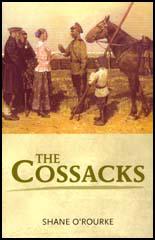
Title: The Cossacks
Author: Shane O'Rourke
Editor:
Publisher: Manchester University Press
Price: £15.99
Bookshop: Amazon
Spartacus Website: Russian Civil War
Category:
This is an exceptional book covering 500 years of the history of the Cossacks the recklessly brave, wild horsemen or the romantic hero of the steppe or the brutal mounted policemen, as they have been remembered throughout history. Starting with a description of the world of the steppe before moving on to a more detailed analysis of the circumstances in which the Cossacks emerged and flourished in the fifteenth and sixteenth centuries, the author considers the relationship of the Cossacks to the surrounding states in the seventeenth and eighteenth centuries through the prism of three great conflicts: the revolts of Bohdan Khelmnytsky, Stepan Razin and Emel ian Pugachev. The author then looks at the Cossacks from the end of the Pugachev revolt in 1774 until the outbreak of the First World War, as well as the Cossacks in the Russian revolutionary period and under Soviet power. A lucid and engaging book that conveys the passion, exuberance and tragedy of these extraordinary people, it will be enjoyed by students, scholars and general readers interested in Russian history.
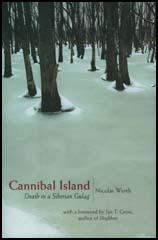
Title: Cannibal Island: Death in a Siberian Gulag
Author: Nicolas Werth
Editor:
Publisher: Princeton University Press
Price: £14.95
Bookshop: Amazon
Spartacus Website: Stalin's Great Purges
Category:
During the spring of 1933, Stalin's police rounded up nearly one hundred thousand people as part of the Soviet regime's "cleansing" of Moscow and Leningrad and deported them to Siberia. Many of the victims were sent to labor camps, but ten thousand of them were dumped in a remote wasteland and left to fend for themselves. "Cannibal Island" reveals the shocking, grisly truth about their fate. These people were abandoned on the island of Nazino without food or shelter. Left there to starve and to die, they eventually began to eat each other. Nicolas Werth, a French historian of the Soviet era, reconstructs their gruesome final days using rare archival material from deep inside the Stalinist vaults. Werth skillfully weaves this episode into a broader story about the Soviet frenzy in the 1930s to purge society of all those deemed to be unfit. For Stalin, these undesirables included criminals, opponents of forced collectivization, vagabonds, gypsies, even entire groups in Soviet society such as the "kulaks" and their families. Werth sets his story within the broader social and political context of the period, giving us for the first time a full picture of how Stalin's system of "special villages" worked, how hundreds of thousands of Soviet citizens were moved about the country in wholesale mass transportations, and how this savage bureaucratic machinery functioned on the local, regional, and state levels. "Cannibal Island" challenges us to confront unpleasant facts not only about Stalin's punitive social controls and his failed Soviet utopia, but about every generation's capacity for brutality - including our own.
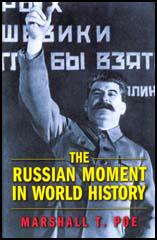
Title: The Russian Moment in World History
Author: Marshall T. Poe
Editor:
Publisher: Princeton University Press
Price: £8.95
Bookshop: Amazon
Spartacus Website: Joseph Stalin
Category:
Is Russian history one big inevitable failure? The Soviet Union's demise and Russia's ensuing troubles have led many to wonder. But, this is to look through a skewed prism indeed. In this provocative and elegantly written short history of Russia, Marshall Poe takes us well beyond the Soviet haze deep into the nation's fascinating - not at all inevitable, and in key respects remarkably successful - past. Tracing Russia's course from its beginnings to the present day, Poe shows that Russia was the only non-Western power to defend itself against Western imperialism for centuries. It did so by building a powerful state that molded society to its military needs. Thus arose the only non-Western path to modern society - a unique path neither "European" nor "Asian" but, most aptly, "Russian." From the fifteenth to the eighteenth centuries, Russia prevailed despite unparalleled onslaughts by powerful Western armies. However, while Europe nurtured limited government, capitalism, and scientific and cultural revolution, early Russian society cultivated autocracy and command economics. Both Europe and Russia eventually created modern infrastructures, but the European model proved more productive and powerful. The post-World War I communist era can be seen as a natural continuation of Russia's autocratic past that, despite its tragic turns, kept Russia globally competitive for decades. The Russian moment in world history thus began with its first confrontations with Europe in the fifteenth century, and ended in 1991 with the Soviet collapse. Written with verve and great insight, "The Russian Moment in World History" will be widely read and vigorously debated by those who seek a clear and unequivocal understanding of the complex history that has made Russia what it is today.
